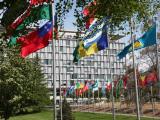(CIDRAP Business Source Osterholm Briefing) – No, the World Health Organization (WHO) has not declared the novel H1N1 (swine) influenza outbreak a pandemic. It should. And it may. But your next steps need not depend on the WHO raising the pandemic alert level to phase 6. In fact, they shouldn't depend on it.
What matters most at this moment is not the number of the phase, but how we respond to the real (and perceived) threat of this genuine influenza pandemic.
Going global
The fact that the virus is causing "sustained community-level outbreaks" in Japan, a country in "another WHO region" means the outbreak has reached the global threshold that qualifies it as a pandemic. That's according to the very measure the WHO set forth in its latest iteration of alert phases. But, unfortunately, science isn't guiding the agency's decision at the moment.
I have a feeling that may change very shortly as "influenza scientists" around the world are becoming increasingly vocal in their conclusion; we have an influenza pandemic with the new H1N1 virus. Fortunately it is primarily a mild illness for most of those infected, but we all know that could change with a single virus mutation.
The agency is under pressure to incorporate severity level into its decision, to account for the "mild" nature of the current outbreak before calling a full-blown pandemic that could trigger what some worry would be risky and costly actions.
But the phases have always been about how well the novel influenza virus passes between people, never how sick it makes them. Mild, moderate, or worse, severity is not part of what defines a pandemic. Maybe it should be. Maybe it can be. But for now, it isn't. And I'd much prefer that WHO preserve its credibility and stick to science and avert confusion.
Whether the WHO raises the alert level to phase 6 shouldn't have much impact on business, but it might.
Much depends on how governments react, particularly the governments of Asia. A misinterpretation of the phases means trouble. Such actions as closing borders, quarantining passengers, and screening people at airports are totally unnecessary, bad for business, and likely to worsen problems. Without taking extreme measures, there's simply no containing or even dampening the transmission of this virus anymore. Close a border, and people will still find a way in. Same for an influenza virus. Imagine having 11 screen doors on a submarine and closing only 10; you're still going to sink.
Swimming with the sharks?
The bottom line is that we have what amounts to a pandemic on our hands, and companies need to adjust accordingly. Our attention must be on its impact on the health of the population. And right now the impact is limited. So here's what I suggest:
1. Be ready for a mixed bag of reactions. If you're an international company, you'll likely see great variability in responses from different countries. The novel virus is acting much like a seasonal strain of influenza, and it's causing what could be considered a "mild" pandemic right now. But how countries and others react may not be proportionate to the severity of the pandemic. Are you ready if borders close in Asia?
Also, be mindful that your organization's pandemic plan may have action steps such as "no travel" or "mandatory work from home" policies that are triggered with a WHO phase 6 declaration. Now is the time to reconsider these actions in light of the mild illness spectrum. They can always be reinstated if the disease picture suddenly worsens.
2. Stay tuned. Is this a mild first wave? Will the pandemic fizzle out and be gone for good? Will the virus keep spreading—and mutate into a strain that could become moderate or severe? It's anyone's guess at the moment. But investigators are finding new pieces of the puzzle almost daily, and the CIDRAP Business Source team is monitoring the science closely. You'll be the first to know what we know. You have my word on that.
3. Take advantage of the gift of this wake-up call. We certainly don't want to scare anyone into becoming more prepared, but this "grace period" (to quote WHO Director-General Margaret Chan) is an opportunity to make your case for more attention to preparedness. What we're seeing right now is akin to a seasonal influenza of moderate severity, which certainly is worthy of note by any business, and that could change on a dime. What would a year of severe seasonal influenza do to your business?
Bottom line for business
The pandemic threat to your business is far from over. Count on us for the intelligence you need to calibrate your company's response responsibly.



















